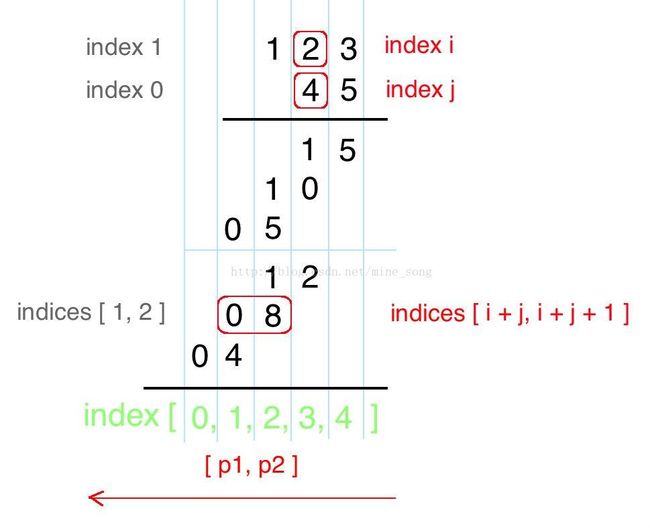LeetCode-43. Multiply Strings (JAVA)大整数乘法
43. Multiply Strings
Given two non-negative integers num1 andnum2 represented as strings, return the product of num1 andnum2.
Note:
- The length of both
num1andnum2is < 110. - Both
num1andnum2contains only digits0-9. - Both
num1andnum2does not contain any leading zero. - You must not use any built-in BigInteger library orconvert the inputs to integer directly.
倾向于第二种解法:
参考:
两个非常大的数字相加,相减(JAVA)
第一种
`num1[i] * num2[j]` will be placed at indices `[i + j`, `i + j + 1]` public String multiply(String num1, String num2) {
int m = num1.length(), n = num2.length();
int[] pos = new int[m + n];
for (int i = m - 1; i >= 0; i--) {
for (int j = n - 1; j >= 0; j--) {
int mul = (num1.charAt(i) - '0')
* (num2.charAt(j) - '0');
int p1 = i + j, p2 = i + j + 1;
int sum = mul + pos[p2];
pos[p1] += sum / 10;
pos[p2] = (sum) % 10;
}
}
StringBuilder sb = new StringBuilder();
for (int p : pos)
if (!(sb.length() == 0 && p == 0))
sb.append(p);
return sb.length() == 0 ? "0" : sb.toString();
}第二种
public String multiply(String num1, String num2) {
if (num1.equals("0") || num2.equals("0"))
return "0";
int n1 = num1.length();
int n2 = num2.length();
int[] products = new int[n1 + n2];
for (int i = n1 - 1; i >= 0; i--) {
for (int j = n2 - 1; j >= 0; j--) {
products[i + j + 1] += ((int) num1.charAt(i) - '0') * ((int) num2.charAt(j) - '0');
}
}
int carry = 0;
StringBuilder sb = new StringBuilder();
for (int i = n1 + n2 - 1; i >= 0; i--) {
int tmp = products[i] + carry;
sb.append(tmp % 10);
carry = tmp / 10;
}
sb.reverse();
if (sb.charAt(0) == '0')
sb.deleteCharAt(0);
return sb.toString();
}